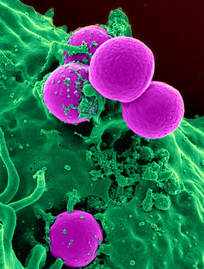|
What comes to mind when you think of allergies? Do you think of sniffling and sneezing from pollen, or peanuts and penicillin?
Allergies can encompass the entire body and what makes one person sick doesn't bother the other. Why? People can be allergic to anything from apples to zucchini, and their responses can be just as varied, but one thing is for sure, allergies are becoming more common around the globe.
First, let's look at what allergy technically means. The word itself is based from the Greek word "allos" meaning an altered action or reaction and was first used in the early 1900s.
An allergic reaction happens when your immune system gives an amplified response to a trigger, otherwise known as an allergen. For example, if you're allergic to grass pollen that means your immune system is having an exaggerated response to an allergen ( the grass pollen). Getting rid of your symptoms isn't as easy as taking a Claritin. Most people assume their allergies have something to do with their bodies making too much histamine, so they take medications thinking that'll work, but there's a lot more to it than just that. There are different types of allergies, different kinds of hypersensitivities, plus categories of allergens, so you can understand how diagnosing a particular allergy can be quite tricky. What's Happening Inside My Body?
When an allergen enters your body, your immune system is alerted, and there are a few ways your body can respond. There are four categories of hypersensitivity; we define these by the amount and type of antibodies your body produces for the allergen.
Before we get into more detail, let's meet five-year-old Timmy and learn how an allergic reaction starts. The first time the body is exposed to a trigger it usually doesn't show any symptoms. If little Timmy touches poison ivy for the first time and doesn't break out, that doesn't mean he's not allergic to it. Allergic responses almost always happen in the second or third exposure. The first time Timmy came in contact with the poison ivy, his body remembered it and built antibodies just in case those pesky ivy triggers returned. By the second time he's exposed, his body releases those antibodies, and by the third and fourth exposure, Timmy's immune system is in full war mode; to put it more simply this reaction is a learned behavior by the immune system.
Timmy has an allergic reaction to poison ivy because his immune system created antibodies called immunoglobulins. Immunoglobulins are proteins that act like antibodies inside the immune system. There are various kinds of immunoglobulins and doctors typically measure these to diagnosis the allergy.
After the body creates the immunoglobulins, they adhere to the allergens and release mediators, substances released from cells, like histamine to make Timmy itch and swell. In the most common allergy reaction, a Type 1 Allergy Response, the antibody that the body creates is called immunoglobulin E (henceforth referred to as IgE). The IgE antibodies attach themselves to the allergen then releases what I like to think of as toxic gas, but they're called mediators (like histamine), into the tissues with a bang. Several types of immunoglobulins produce responses inside the body, but IgE is the most common. Timmy's infected arm is red, and he can't stop itching it, so his mother decides it's time to visit the doctor. Getting Diagnosed
Timmy's mom sits next to him in the allergist's office while the doctor performs a "scratch test" on her son.
Skin tests like this are looking for swelling or redness created by the IgE antibodies when they come in contact with various allergens.
Blood tests to determine allergy look for the presence of IgE antibodies in the bloodstream. But allergies go beyond just the antibody IgE. Several other immunoglobins cause responses in your body that your doctor doesn't always look for. Dr. Devi Numburipad writes in his book "Say Goodbye to Illness," "The activation of immunoglobulin type E (IgE) antibodies causes what the traditional medical profession calls 'true' allergies; however, millions of people experience various allergic symptoms every day in varying degrees without producing these antibodies. These types of reactions can be called either intolerance or hypersensitivity."
Here's a breakdown of a few critical immunoglobulins:
IgM is the first antibody released in an allergic reaction (think first responders) IgE is the most common antibody released in allergic response (think itching) IgG is the primary antibody in the blood protecting us against bacteria and viruses. It also creates a delayed allergic reaction from a few hours to even days. (think Lyme's after a tick bite) IgA These antibodies are formed when allergies are related to the mucous membranes. (think congestion)
Putting that information into allergy terms, IgE and IgM antibodies are responsible for the immediate reactions and hypersensitivity to a particular trigger. IgA is the antibody associated with mucus. IgG produces a delayed response to an allergen from hours to even days later. Some people only have IgE antibodies in their bloodstream, but most have more than that, giving us a far better picture of what's going on.
If you have an allergic reaction, your doctor will more than likely perform a scratch test to look for the IgE antibodies, just like little Timmy. But if you're experiencing symptoms related to Lyme's, your doctor will take a blood test and search for the IgG and IgM antibodies. If you're only looking for IgE antibodies, you may be missing something. But just like there are many immunoglobulins and mediators your immune system produces, there are several types of hypersensitivity. While we're waiting on Timmy's scratch test results, let's learn about the different types of hypersensitivity with allergies. TYPES OF HYPERSENSITIVITY RESPONSES
TYPE 1 SENSITIVITY
Type 1 Allergy is the most common and includes asthma, eczema, hives, hay fever, and conjunctivitis. "In type 1 hypersensitivity, B-cells are stimulated (by CD4+TH2 cells) to produce IgE antibodies specific to an antigen. The difference between a normal infectious, immune response and a type 1 hypersensitivity response is that in type 1 hypersensitivity, the antibody is IgE instead of IgA, IgG, or IgM" via Wikipedia. TYPE 2 and 3 HYPERSENSITIVITY Type 2 and 3 are harder to diagnose because standard allergy tests are only looking for IgE. Allergy Types 2 and 3 are dependant on the impact of IgG-the antibody responsible for protecting us against viruses and bacteria- to amplify an allergic response. These types of allergies also produce the symptoms I see most often: food allergies, stomach pain, headaches, fatigue, and joint pain. In Type 3 hypersensitivities, people experience reactions not just from outside forces, but from within their own bodies. IgG is a crucial antibody we need for a healthy immune response. A lack of enough IgG antibodies means you're more likely to suffer from recurring bacterial infections big or small, and people with autoimmune disease often have lower amounts of IgG antibodies circulating in their bloodstream and fewer T-reg cells, making for a weaker immune system. TYPE 4 HYPERSENSITIVITY Type 4 Hypersensitivity skips the entire "create antibodies, release mediators, and inflame" part and goes right into killer immune system mode, like a Code Red at the Pentagon, but there's a delayed response. Poison ivy and oak are both examples of Type 4 Hypersensitivity because of the delayed response. In this type of reaction, the immune system bypasses creating antibodies and calls in the big guns named Helper Lymphocytes. Lymphocytes are white cells made to protect the body from disease and include B cells and T cells. The Helpers then recruit the Killer Lymphocytes. The Killers go right to the allergen and destroy, destroy, destroy. Sounds great until you realize that the Helper and Killer cells also produce mediators while they combat the allergen. Helper Lymphocytes are even involved in the damage that happens in RA, Crohn's disease, Hashimoto's, and other autoimmune diseases.
Allergy responses fluctuate and very rarely does anyone only have one reaction and one type of allergy, most often it's a mixture of many factors.
The allergist returns and writes in her patient file "IgE positive, moderate response/Type 4" then looks up to Timmy's mom. "Well, it looks like he's just reacting to poison ivy and symptoms should get better in a few days- no scratching- call me if you need anything else." and she slips out of the room. Timmy's case was pretty open and shut, but many allergies don't just affect your nose or your skin. Weight gain, fatigue, bloating, brain fog, headaches, constipation, and joint pain are all symptoms of allergic reactions. "Allergy occurs when the part of your immune system that controls unwanted immune responses fails to function properly. It's actually an immune deficiency state that results in excessive inflammation." says Dr. Leo Galland in his book "The Allergy Solution." Some allergies you can control, others reverse, and many you can prevent. But before you know how to fight back, you must first understand what you're working with, and it's not histamine, it's your immune system.
Numerous studies have proven that a stable and functioning immune system is essential for ridding yourself of allergy symptoms. The way we develop that strength is by eating a whole food diet with particular attention paid to foods that will support your immune system with the best flavonoids and phytonutrients.
If you're suffering frequent headaches, sinus infections, or fatigue there's a chance it's coming from an allergy. Understanding what your body is doing is essential before you pop that pill or walk into the doctor's office. Educate yourself and make sure you're being tested for the right antibodies and are receiving the proper treatment for your symptoms. Once you know the details, you can create a plan to prevent, control, and maybe even heal your allergies.
0 Comments
Leave a Reply. |
Categories
All
Linda's BlogsArchives
October 2019
AuthorLinda Lavender writes articles to help folks with Auto Immune Disease, Depression, Anxiety and other health related illnesses. |


 RSS Feed
RSS Feed